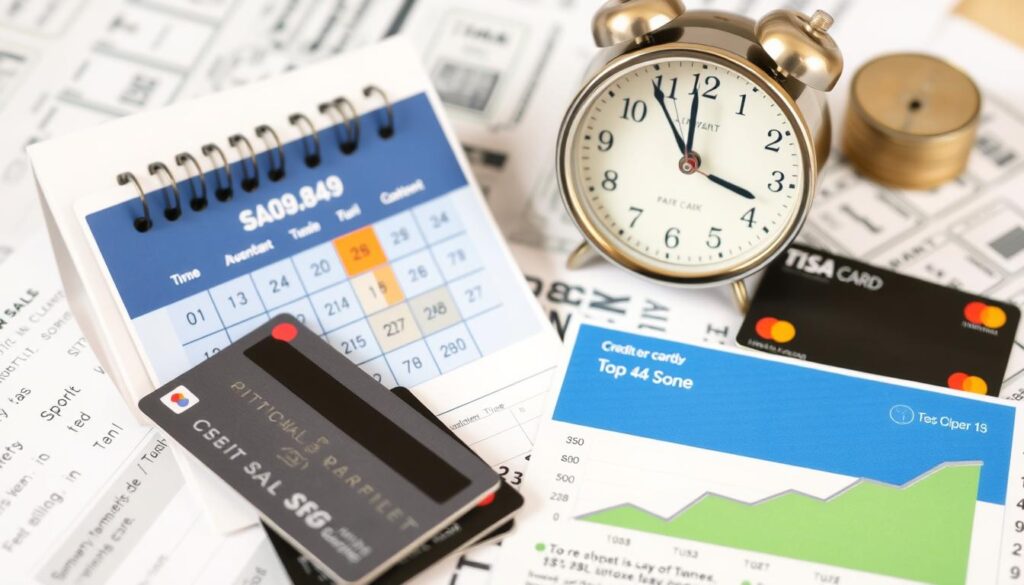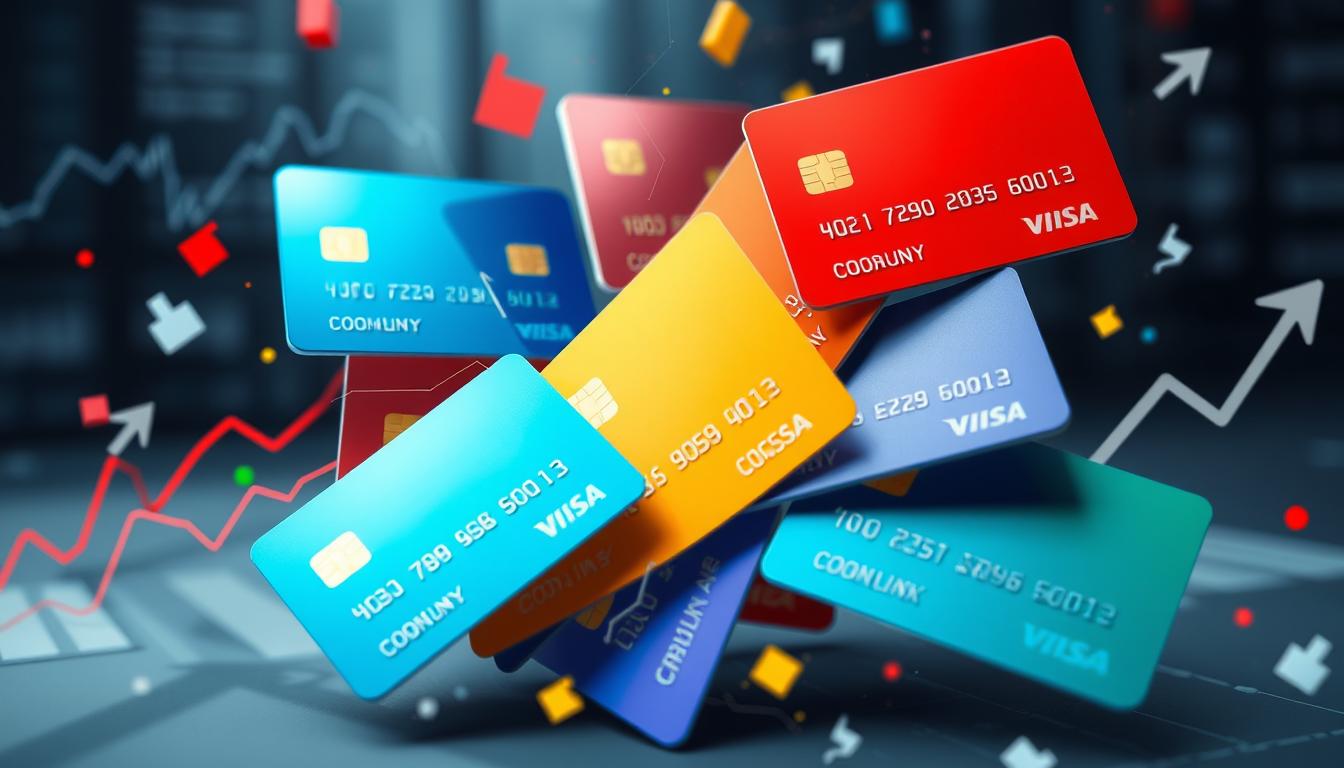Credit card churning is a strategy for getting more rewards and benefits. But, it can also affect your credit score. It’s important to know the risks before you start. This article will cover the basics of credit card churning, its benefits and risks, and how to protect your credit score.
Key Takeaways
- Credit card churning involves repeatedly opening and closing credit cards to earn sign-up bonuses and rewards.
- While it can provide valuable rewards, credit card churning can also negatively impact your credit score.
- Understanding the effects of hard inquiries and credit utilization ratio is crucial when engaging in credit card churning.
- Strategies like spacing out applications and maintaining a good credit history can help mitigate the impact on your credit score.
- Responsible credit card usage, such as paying bills on time and keeping balances low, is essential for rebuilding credit after churning.
What is Credit Card Churning?
Credit card churning means using credit cards to get big bonuses and rewards. It’s a smart way to earn lots of money from cards. People use this method to get the most out of their credit cards.
Understanding the Practice
It’s all about getting new cards, earning bonuses, and then closing them before fees kick in. This cycle is done with a list of chosen cards. The goal is to get rewards without hurting your credit score.
Benefits and Risks
The main perk is earning credit card rewards fast, like cash back or travel points. This can lead to free trips or big savings. But, there are downsides. Applying for many cards can lower your credit score temporarily. It can also mess with your credit card strategy and credit card utilization ratio.
“Credit card churning can be a powerful tool for savvy consumers, but it requires careful planning and responsible management to maximize the benefits while minimizing the risks.”
Credit Card Churning Credit Score Impact
Credit card churning can affect your credit score in different ways. This method involves getting and closing cards to earn rewards. It can both help and hurt your credit profile.
One major impact is from credit inquiries. Each new card application adds a hard inquiry to your report. This can lower your score temporarily. The more inquiries, the bigger the impact.
Credit utilization ratio is another key factor. It shows how much credit you’re using compared to what’s available. New cards increase your limit, which can improve your score. But closing cards reduces your limit, possibly hurting your score.
| Factors | Impact on Credit Score |
|---|---|
| Credit Inquiries | Temporary decrease |
| Credit Utilization Ratio | Potential increase or decrease |
| Credit History Length | Potential decrease |
The length of your credit history matters too. Closing cards can shorten your credit history. Longer histories make your credit look more stable to lenders.
The effect of credit card churning on your score depends on the balance of good and bad. Weigh the rewards against the risks carefully before starting.
How Credit Card Churning Affects Your Credit Score
Credit card churning can really affect your credit score. It’s important to know how it works. This way, you can use it wisely without harming your score.
Hard Inquiries
Hard credit inquiries are a big deal when it comes to churning. Every time you apply for a new card, it counts as a hard inquiry. This can lower your score for a bit. Too many inquiries in a row can make lenders think you’re riskier.
Credit Utilization Ratio
Your credit utilization ratio is also affected by churning. It shows how much credit you use compared to what’s available. Closing cards can raise this ratio, hurting your score.
To keep your score up, apply for new cards less often. Also, keep your balances low on all cards. This helps your credit utilization ratio stay healthy.
“Responsible credit card usage, including paying bills on time and keeping balances low, is crucial for maintaining a healthy credit score, even if you engage in credit card churning.”
Strategies to Minimize the Impact
Exploring credit card churning can be tricky. It’s all about getting rewards without hurting your credit score. There are ways to keep your credit score healthy while still enjoying the perks of churning.
Timing your applications right and keeping an eye on your credit use are key. These steps help you enjoy churning without harming your financial future.
Spacing Out Applications
Spacing out your credit card applications is a smart move. Don’t apply for many cards at once. Instead, apply for one or two every 6-12 months. This reduces hard inquiries on your report, which affect your score.
- Try to wait at least 6 months between applications to protect your score.
- Match your application timing with your financial goals and spending habits for the best results.
- Plan your churning strategy carefully, thinking about when and how many applications you’ll make.

By managing when you apply for cards, you can keep your credit score strong. This way, you can enjoy the benefits of churning without worrying about your credit.
The Role of Credit History
Credit card churning can affect your credit score, and your credit history is key. The length of your credit history matters a lot. It can change how much churning impacts your score.
Credit age is a big part of your credit score. Lenders like it when you’ve had credit for a long time. It shows you’re good at managing credit.
If you’ve had credit for a while, churning might not hurt your score as much. Your score looks at many things, and a long history can help. It can balance out the effects of new credit or changes in how much you use your cards.
But, if you’re new to credit, churning can hit you harder. New accounts and applications can affect your score more. This can lead to a bigger and longer-lasting drop in your score.
Remember, credit history is just one thing that affects your score. Payment history, how much you use your cards, and the types of credit you have also matter. All these things help figure out how trustworthy you are with money.
| Credit History Factor | Impact on Credit Card Churning |
|---|---|
| Credit Age | Longer credit history may mitigate the impact of churning |
| Payment History | Consistent on-time payments can help offset the effects of churning |
| Credit Utilization Ratio | Keeping balances low can help minimize the impact of churning |
| Credit Mix | Diversified credit types can provide stability to your credit profile |
Knowing how your credit history affects churning can help you. You can make choices that protect your score. This way, you can avoid big drops in your credit score.
Responsible Credit Card Usage
Using credit cards wisely is key when you’re churning them. Your payment history and how much you use your credit are big parts of your score. By following some simple steps, you can avoid harming your credit while churning.
Paying Bills on Time
It’s vital to pay your bills on time, every time. Payment history is a big part of your score. A missed or late payment can hurt a lot. Set up automatic payments or reminders to avoid forgetting due dates.
Keeping Balances Low
Keeping your balances low is also important. Your credit utilization ratio shows how much you use your credit. Try to keep your balances under 30% of your limit to show you’re managing your credit well.

By paying on time and keeping balances low, you show lenders you’re responsible. This approach helps keep your credit score strong. It also ensures a secure financial future for you.
Tips for Rebuilding Credit After Churning
If you’ve recently churned credit cards, your credit score might have dropped. But, there’s hope. You can use several strategies to rebuild your credit. Here are some practical tips to help you recover.
Maintain Positive Payment History
A strong credit score starts with on-time payments. Always pay your bills, including credit card balances, on time. This shows lenders you’re serious about managing your credit well.
Reduce Credit Utilization
Credit utilization is key to your credit score. After churning, aim to keep your credit card balances low. Try to keep them below 30% of your total limit. This shows you’re using credit wisely.
Diversify Your Credit Mix
A good credit report has different types of credit. If you’ve mostly used credit cards, try adding other types. This shows you can handle various credits, improving your profile.
Monitor Your Credit Reports Regularly
Watch your credit reports from Experian, Equifax, and TransUnion. Make sure the info is right. Dispute any mistakes to boost your score.
Rebuilding credit after churning takes effort, but it’s possible. Stick to good payment habits, keep your credit use low, and diversify your credit. Also, check your reports often. With these steps, you’ll be on your way to rebuilding credit after churning and reaching your financial goals.
Alternative Ways to Earn Rewards
If you want to avoid the risks of credit card churning, there are other ways to earn rewards. Loyalty programs and cashback apps are great options. They let you earn rewards without hurting your credit score.
Loyalty Programs
Many stores, airlines, and hotels have loyalty programs. They give you points or miles for your purchases. This way, you can earn rewards without needing to apply for many credit cards.
Whether you fly a lot or shop at one store a lot, these programs are good. They help you earn rewards without the downsides of credit card churning.
Cashback Apps
Cashback apps like Rakuten, Ibotta, and Honey make earning rewards easy. They work with many retailers to offer cash back or discounts. By using these apps, you can increase your rewards without affecting your credit score.

